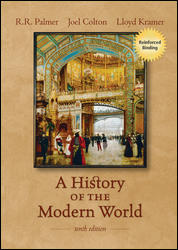 
History of the Modern World, 10th Edition (Palmer)Chapter 8:
The Age of EnlightenmentLearning ObjectivesChapter 8 teaches students about:
The enduring impact of Enlightenment ideas on political revolutions, cultural movements, and intellectual debates. |
 |  |  |
The dominance of the idea of progress and the countervailing tendencies of religious fervor in the eighteenth century. |
 |  |  |
The role of the philosophes and physiocrats, their influence on an expanding reading public, and the centrality of Paris in the Enlightenment. |
 |  |  |
Enlightened despotism, its secularism, rationality, and reformism. |
 |  |  |
The successes and failures of enlightened despotism in France, Austria, Prussia, and Russia. |
 |  |  |
The partitions of Poland, which forever changed the balance of power within Europe as a whole and signaled the importance of establishing strong sovereignty. |
 |  |  |
The wave of revolutionary activity that commenced in the late eighteenth century and continued until the mid-nineteenth century.. |
 |  |  |
The middle-class, or bourgeois, nature of the democratic revolutions. |
 |  |  |
The reform movement in Britain and the push by Parliament to centralize the empire. |
 |  |  |
The American Revolution, the intervention of European powers in the conflict, and the limited advances of democracy and equality in the new states. |
 |  |  |
The inspiration that the American Revolution provided, as well as its vindication of Enlightenment ideals. |
 |  |
|





